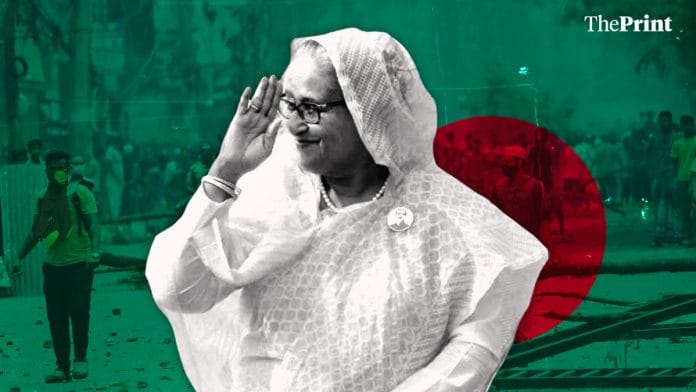New Delhi: From taking forward her father Sheikh Mujibur “Bangabandhu” Rahman’s legacy to navigating tense relations with the West and finally fleeing her own country, Sheikh Hasina has had a checkered political career.
On Monday, Bangladesh Army chief Waker-uz-Zaman in a statement to the media confirmed Hasina’s resignation, adding that an interim government will rule in her place for now.
Recognised as one of the most powerful women in South Asia by being at the helm of her country for decades and notably, as the daughter of Bangladesh’s founding father and first president, she has been credited with taking Bangladesh to new economic heights and seeing the completion of critical development projects in the country.
However, the sidelining of the Opposition in the last three elections, say experts, cast a cloud over her rule and the renewed anti-quota protests were viewed as the last straw.
During this time, Bangladesh also saw strained relations with the US with Washington repeatedly voicing concern over alleged political unfairness and human rights violations in the South Asian country.
In May this year, without naming a particular country, Hasina said “a white man” offered her a smooth return to power, ahead of January’s elections, in exchange for an airbase in Bangladesh. She was also not invited to two of the Biden administration’s “Summits for Democracy” even though India, Pakistan and Bangladesh’s other neighbours were invited.
It was only this January that the 76-year-old politician secured a fifth term in office, much to India’s liking. Though experts had warned at the time that New Delhi risked putting all its eggs in one basket in the long run. The US had also voiced concerns over the January elections in Bangladesh, saying they were not free and fair.
Sheikh Hasina’s arrival in India Monday after resigning from the PM’s post signals how deep the Dhaka-Delhi relationship runs even amid a rising China.
Hasina had lived in exile in India in the 1980s, during which she was elected as president of the Awami League (AL). Her visit to India this June was the first incoming bilateral state visit by a foreign leader after the Lok Sabha elections in India. Although, by this time, she had already attended Prime Minister Narendra Modi’s swearing-in ceremony.
Then in July, she said she would “prefer” India over China to take up a strategic project for development of the Bangladeshi section of the Teesta River.
“Sheikh Hasina enjoyed a positive premiership for many years. She was credited for many successful development projects and for lifting the Bangladeshi economy. But denying the Opposition a level playing field in the last three elections worked against her. In the end, it was clear she was disconnected from the ground — from the public and especially the youth,” Sreeradha Datta, professor at Jindal School of International Affairs, O.P. Jindal Global University, told ThePrint.
In June 2022, the Hasina government completed the construction of the Padma Bridge almost 10 years after the World Bank withdrew its financing of the project. This was viewed as a win for Hasina who has had tense relations with Washington DC.
Also Read: Daughter’s illness or friction with Beijing? Bangladesh PM Sheikh Hasina cuts China trip short
Exile in India, her father’s liaison
Hasina was born in erstwhile East Pakistan in 1947. She is the daughter of “Bangabandhu” (friend of Bengal) Rahman, Bangladesh’s founder and first president. Rahman led the movement for Bangladesh’s separation from Pakistan in 1971.
Hasina graduated from Dhaka University in 1973 after studying Bengali literature.
She played a key role in politics at the time, and as her father’s liaison when he was jailed by the Pakistani government.
In 1975, army officers assassinated her father and other members of the family as part of a military coup led by then army chief General Hussain Muhammad Ershad. Hasina and her younger sister, Rehana, were the only survivors as they were in West Germany at the time. She spent six years in exile in India at a house in Delhi’s Pandara Road with her children.
“India is our trusted friend. During our Liberation War, they supported us… after 1975, when we lost our whole family… they gave us shelter,” she had recounted in Dhaka in January, ahead of the general election in Bangladesh.
Hasina returned to Bangladesh in 1981 and became a strong advocate for democracy. In 1991, the first free general election was held in Bangladesh after nearly 16 years.
Khaleda Zia, leader of the rival Bangladesh Nationalist Party, won the polls at the time. Hasina and her party boycotted parliament on several occasions during Zia’s rule. She was also put under house arrest many times in the years to come.
But the tide turned in 1996, when Hasina clinched her first term as prime minister of Bangladesh from June. She served till 2001. Then, until 2008, she served as the leader of the opposition. During this time, she survived an assassination attempt in 2004, when an Awami League gathering in Dhaka was attacked with a grenade.
She came to power again in 2009 and had remained at the top position since.
(Edited by Nida Fatima Siddiqui)
Also Read:






